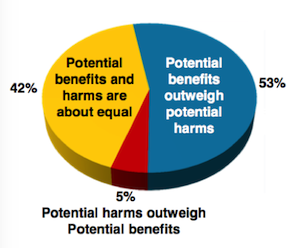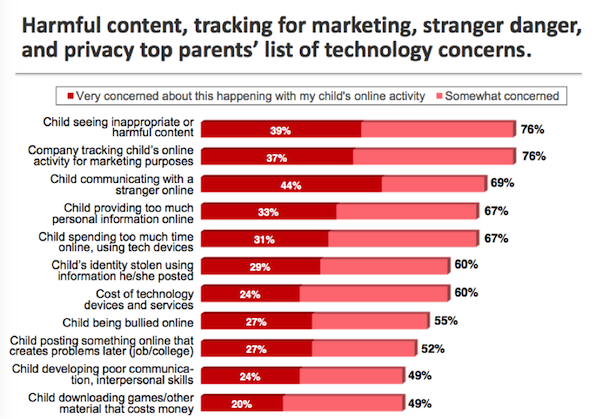Last November, I went to the Family Online Safety Institute (FOSI) Conference, "Redefining Online Safety," in Washington D.C. prepared for all kinds of scary talk about stranger danger, online predators, cyber bullying, sexting, and more.
But surprisingly, and thankfully, the online safety conversation has changed and is not as fear-based or reactionary as it has been in the past. That’s because people are starting to appreciate technology’s benefits, while understanding that sometimes these benefits come with inherent, yet manageable, risks.
According to a FOSI study, conducted by Hart Research Associates and presented at the conference, 53 percent of parents surveyed report that the benefits of their kids' using electronic devices outweigh the potential harms. And 42 percent say the two are about equal.

Additionally, despite heavy media focus on cyber bullying, this study found that the top “harms” parents are actually most worried about are their children being tracked by online marketers and viewing inappropriate or harmful content.
There was a very clear consensus amongst the tech industry representatives, policy makers, non-profits, and academics at the FOSI event on the best way to mitigate online “harms”: Education. This education, it was agreed, should reflect the growing positive attitude about tech and include fundamentals such as digital citizenship, resiliency, coping strategies, critical thinking, accountability, compassion, ethics, empathy, and of course, online safety. Teaching kids (teaching everyone really) skills like these will foster an atmosphere where the social norms that will guide our online practices of the future can grow.

Facebook's Policy Director for UK, Middle East and Africa Simon Milner stressed "the importance of working with schools" in accomplishing the task of teaching children these skills and FOSI's own research finds teachers and schools to be the "most trusted source for information about their kids' use of technology."
Unfortunately teaching students the skills that will help keep them safe online is not happening on a wide scale, at least not in American classrooms.
It is happening is Canada, however, where media literacy is mandated policy and where they are now reaping the positive results. According to MediaSmarts' Co-Executive Director Jane Tallim, who presented findings from their own research titled "Young Canadians in a Wired World," Canadian students are careful about their personal information, know how to manage privacy settings and are thoughtful about crafting their online image.
As a digital literacy educator in the U.S., I'm one of the lucky few afforded the opportunity to teach students these skills in school. In 7th grade my students learn about “online safety” and "online privacy" by first learning the vocabulary -- cookies, third parties, personal information, targeting, tracking, etc. They are required to read the "Privacy Policies" and "Terms of Use" of the sites they use most, like Instagram, Snapchat and Vine. Believe it or not, students actually enjoy learning about things relevant to their lives, and they get excited about what they learn. For instance, when my students found a discrepancy between the minimum "Age of Use" on Snapchat's website (13) and the "Age of Use" posted in the iTunes Store (12+), they enthusiastically composed an email to Snapchat (hey Snapchat, they are still awaiting your reply!).
Lessons like these help answer the "three important privacy questions" that Michael Kaiser, Executive Director of the National Cyber Security Alliance, pointed to at the FOSI event:
What are you collecting about me, how do you use it, and what can I control?
Students deserve to learn about the economy of the Internet, a place where they will be trading personal data for customized information every day of their lives. One boy, after learning about this whole privacy exchange called it, "creepy, but also really cool."
I think understanding the delicate balance between creepy and cool is an essential life skill today and I'm hopeful that FOSI's work "redefining online safety" will finally chip away at the resistance to making digital literacy (including online safety as a component) a top priority in education.
Cover image courtesy of Flickr.
















.svg)

